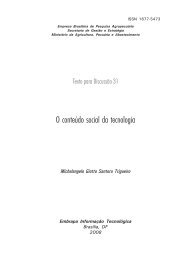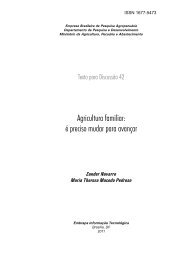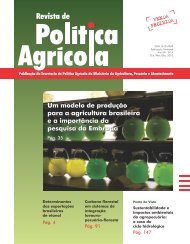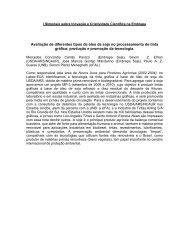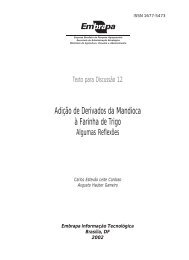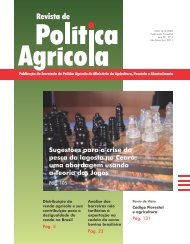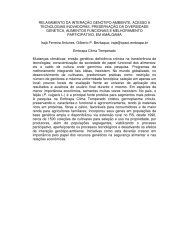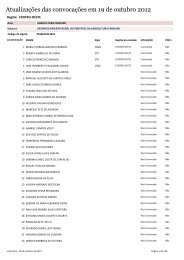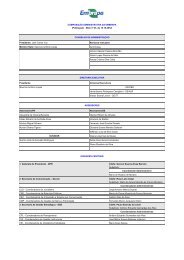Ministry of Agriculture, Livestock and Food Supply - Embrapa
Ministry of Agriculture, Livestock and Food Supply - Embrapa
Ministry of Agriculture, Livestock and Food Supply - Embrapa
Create successful ePaper yourself
Turn your PDF publications into a flip-book with our unique Google optimized e-Paper software.
until the 17th year, in a productive life <strong>of</strong> approximately 25 years. Productivity<br />
is still on the rise in those plantations <strong>and</strong> the agronomic potential is up to 40<br />
tons <strong>of</strong> fruit clusters per hectare with a 22% oil yield.<br />
The region depends heavily on diesel oil for stationary power generators<br />
<strong>and</strong> river craft. The sole company registered to produce biodiesel is called<br />
Agropalma, a large palm oil producer that has installed an esterification unit<br />
<strong>and</strong> uses fatty acids obtained in the oil refining process. The unit's production<br />
capacity is 8,100 tons <strong>of</strong> biodiesel per year, with ethanol as reagent. Another<br />
plant will be built in the State <strong>of</strong> Tocantins with a production capacity <strong>of</strong> 40million<br />
liters/year.<br />
The region's current consumption is more than 3-million tons <strong>of</strong> diesel p.a.<br />
<strong>and</strong>, since the current installed capacity meets slightly more than 10% <strong>of</strong> the<br />
biodiesel volume currently required, it is very unlikely that the region will achieve<br />
self-sufficiency by 2008. Another challenge is decentralizing biodiesel production<br />
using the cracking process to supply remote communities directly; these<br />
communities would produce the raw material <strong>and</strong> transform it into biodiesel.<br />
The long-term prospects <strong>of</strong> using African palm oil as raw material to<br />
meet the regional <strong>and</strong> even national dem<strong>and</strong> for biodiesel are very good.<br />
Nevertheless, there are technological problems to be solved as regards the<br />
use <strong>of</strong> palm oils as raw material. Furthermore, the agronomic cycle <strong>of</strong> palms<br />
is rather long <strong>and</strong> both the economic results <strong>and</strong> the research need more<br />
time to achieve maturity.<br />
Northeast Region<br />
The Northeast Region accounts for 15% <strong>of</strong> the diesel oil consumed in<br />
Brazil. The first biodiesel plants installed in the country are located in the<br />
Northeast Region, namely, Nutec in Fortaleza <strong>and</strong> Brasil Biodiesel in Teresina,<br />
both experimental units with daily biodiesel production capacity <strong>of</strong> 800 <strong>and</strong><br />
2,000 liters, respectively. Brasil Biodiesel has another commercial plant in<br />
Floriano, in the State <strong>of</strong> Piauí.<br />
Because <strong>of</strong> the social slant given to the National Program for the<br />
Production <strong>and</strong> Use <strong>of</strong> Biodiesel from the very beginning, the Program's main<br />
focus in the Northeast Region has been on biodiesel from castor beans. The<br />
crop is fully adaptable to semi-arid areas <strong>and</strong> is an excellent alternative for<br />
family farming. Because <strong>of</strong> its social importance <strong>and</strong> agronomic adaptability<br />
it has been appointed as the crop <strong>of</strong> choice for the initial phase <strong>of</strong> the program.<br />
86



